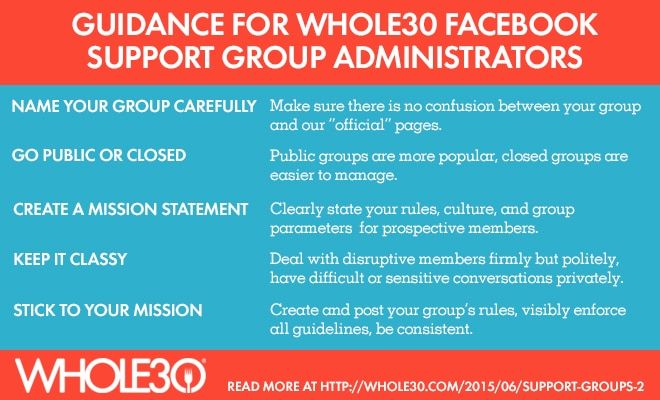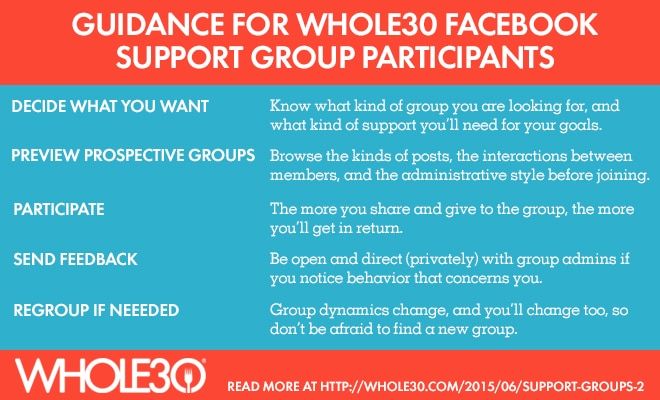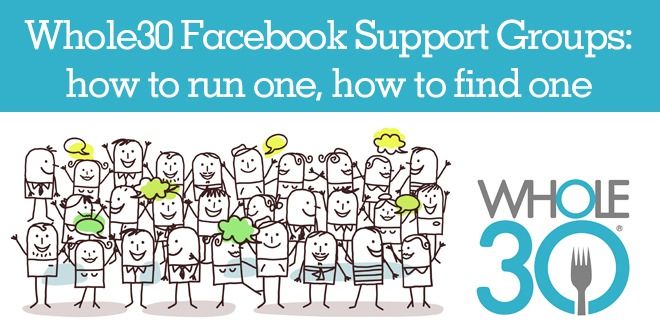Last Monday’s Dear Melissa responded to a woman who was feeling less than supported by her Facebook Whole30 support group. If you haven’t caught up on that one yet, go ahead… we’ll wait. As a follow-up to that article, today we’ll offer some guidance for Whole30 support group administrators, and help those of you looking to join a support group outside of the Whole30 community find the home that’s right for you.
For Facebook Group Administrators
If you are looking to start a Whole30 support group, or are currently administrating one, here are some tips for attracting the right fit for your culture.

Name Your Group Carefully. Be as clear and concise as possible when naming your group. Let people know the purpose, mission, and parameters of discussion. Ideally, the name of your group will attract the right population, while letting others know this group isn’t what they are looking for. Examples of good group names include “Stay-at-Home Moms Love the Whole30,” “Jen’s Whole30, Paleo, and AIP Recipe Exchange,” or “Californians Doing the Whole30.” Tip: Please respect our registered trademark, and make sure your group name clearly identifies you as an independently-run community. Group names like “Whole30 Ireland” or “Whole30 Support” make it seem like you are a group run by Whole30 HQ, and creates confusion in the marketplace. We will ask you to change your group name if we find there is such confusion.
Go Public or Closed. Decide up front whether you want your group to be public, or closed (private). A public group makes the barrier to entry easier, and lets prospective members get a feel for your page and culture before joining. A private group may be easier to manage, however, as you can keep the size limited, and it makes it easier to request that troublemakers leave. Tip: If your group is closed only to a certain population (teachers, church members, grandmothers, etc.) make sure you stick to those parameters, even if your sister’s best friend (who isn’t a teacher/church member/grandmother) wants to join. Members need to feel protected and respected in a deliberately closed environment.
Create a Clear Mission Statement. You may dedicate your group only to the Whole30, or invite anyone participating in a Paleo challenge or other nutrition effort to join. You may set out to be a polite, friendly, PG-rated community where all are welcome; or choose to be a foul-mouthed, tough love, snarky support group not for the faint of heart (or your Grandma). All are okay, as long as it’s clear to your prospective members (and administrators) what you’ll be discussing on the page, and your vibe and culture are outlined clearly. Tip: Pin this statement clearly in a post at the very top of the page, so all members can see the scope of your community support. You could also use the Facebook header graphic to spell out your group’s mission statement and culture loud and clear.
Keep it Classy. Set your standards of communication from the get-go, and do not allow any members (or admins!) to violate your code of conduct or group rules. Period. Even if you go the “rated-R” route, always deal with rude, angry, or disruptive members with courtesy and kindness. Take any difficult conversations off the main page and have them privately, via chat or email. Never allow a member or admin to go beyond the boundaries you’ve set and disrespect another member of your community. Address those situations publicly, but politely. Tip: This group is a reflection of you and your fellow administrators. Your members don’t want to see bickering, “trolling,” or personal insults on the page, nor do they want to see their leaders losing their cool or getting into social media fights. Again, keep it classy.
Stick to Your Mission. Make sure all admins and members are sticking to your mission at hand. If you have a page dedicated to following Whole30 rules 100% and someone posts a recipe for pancakes, decide how you’ll handle it. Conversely, if your page supports all healthy eaters, don’t allow members to insist that others follow a Whole30 or Paleo framework. Decide how you’ll handle disruptive members, add new administrators, respond to member disagreements, etc. The more robust your plan, the more likely you’ll be to attract the kind of members you want, and the easier your community will run. Tip: Develop a publicly posted “rules” document, outlining how your team will handle all of these situations so there are no surprise, and direct all new members to read the document before their first post. For example, “This page is dedicated to following all of the Whole30 rules. Any posts, recipes, or photos that don’t follow the Whole30 program guidelines will be deleted from the page, to ensure that new members aren’t confused.”
For Facebook Support Group Participants
If you are looking to join an online support group, here are some tips to help you choose the place that’s right for your goals. But first, a reminder: All of the Whole30 support groups that you see on Facebook are unaffiliated with the official Whole30 program and community. We have absolutely no involvement in how they are run, what gets posted, or how people are treated. These groups all have their own culture, their own practices, and their own way of managing the group itself. If you are looking for an official answer from the Whole30 team (can I have gum, can I have a snack, do I have to buy grass-fed beef?), consult The Whole30, our website, the Whole30 Forum, or our social media pages (Facebook, Instagram, or Twitter).

Decide What You Want. First, know what you’re looking for. Are you new to the Whole30, and want a support group who are all dedicated to following the Whole30 rules 100%? Or are you currently making small changes, looking for inspiration and motivation from a general health-focused group? Do you do best with lots of love, an encouraging environment, and nothing but sweetness? Or are you looking to have some fun with this, aren’t afraid of a little butt-kicking, and love well-played sarcasm? There are groups out there for every personality, but you’ll have to know what you want (and what you don’t) to find yours. Tip: If you’re new to the Whole30 and committed to the program, do yourself a favor and choose a support group dedicated to following the rules. It can be confusing enough to keep all the guidelines straight; an experience group can help with simple questions, recipe suggestions, ingredient substitutions, etc.
Preview Prospective Groups. Browse prospective groups before you join. (If you’ve been invited to a closed group, you can do this step after you’ve been accepted, but before your first post.) Check out the tone of posts, the kind of comments they receive, and how administrators handle member issues, questions, or concerns. Make sure what you’re seeing is the right group for you. Look for posted documented or pinned posts explaining the nature and culture of the group. Tip: You could also create a post that says, “I’m considering joining your group, but want to make sure it’s the right one for me. Do you follow Whole30 100% here, or are people doing their own thing?” (Include any questions that you find relevant.)
Participate! When you’ve found a group, jump right in and introduce yourself! The more you participate, the more friends you’ll make, lessons you’ll learn, and contributions you’ll share. If this is going to be your primary Whole30 support network, you’ll get just as much from giving as you do from reading. Plus, your participation means you’ll continue to have an impact on the group’s culture, helping to keep it the kind of place you want it to be. Tip: Find a “buddy” or two—someone you connect with and whose perspective resonates with yours. Reach out and see if there are other ways you can stay in touch, via email or even phone or text message for those immediate support needs.
Send Feedback. If you find the group you’re in isn’t holding to their stated mission, isn’t treating members with respect, or is allowing other members to be disruptive or rude, send a private message to the administrators with your concerns. Give them the opportunity to address this before you post your displeasure publicly. Tip: Remember, your admins are all volunteers! They created the group to help people, but they also have real jobs and busy lives. They may not see everything that happens on their page, so give them the benefit of the doubt if you have a compatible or issue.
Don’t Be Afraid to Regroup. As members and administrators come and go, the tone, culture, and dynamics of the group will change as well. In addition, as you make your way through your Whole30 journey, your needs will change too! If you find the group you’re in isn’t fulfilling your needs, don’t be afraid to leave and find a new one. Remember, this group is all about supporting you in the manner in which you need to be supported, so if it’s no longer fitting the bill, find someplace that will. Tip: If you’ve been a prominent member of the group for some time, post a friendly “goodbye,” explaining your reasons for leaving. The administrators will appreciate knowing it wasn’t because of something they did or said, or because you felt disrespected or unappreciated.
Share Your Best Tips
Are you successfully running a Whole30 Support Group, or do you have tips for someone looking to join a group for the first time? Share in comments! image credit: http://ldcarerscommunity.org.uk/
















